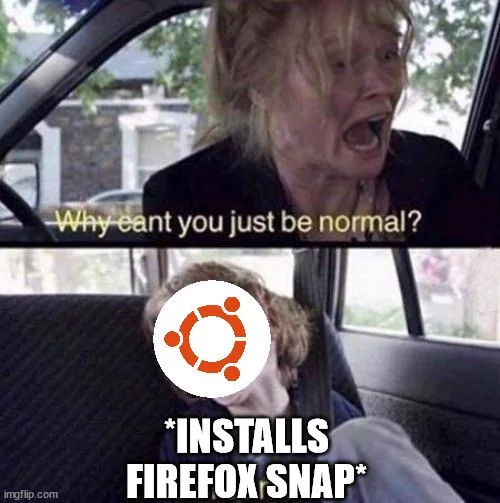Imagine flatpack did smth like this
linuxmemes
Hint: :q!
Sister communities:
- LemmyMemes: Memes
- LemmyShitpost: Anything and everything goes.
- RISA: Star Trek memes and shitposts
Community rules (click to expand)
1. Follow the site-wide rules
- Instance-wide TOS: https://legal.lemmy.world/tos/
- Lemmy code of conduct: https://join-lemmy.org/docs/code_of_conduct.html
2. Be civil
- Understand the difference between a joke and an insult.
- Do not harrass or attack members of the community for any reason.
- Leave remarks of "peasantry" to the PCMR community. If you dislike an OS/service/application, attack the thing you dislike, not the individuals who use it. Some people may not have a choice.
- Bigotry will not be tolerated.
- These rules are somewhat loosened when the subject is a public figure. Still, do not attack their person or incite harrassment.
3. Post Linux-related content
- Including Unix and BSD.
- Non-Linux content is acceptable as long as it makes a reference to Linux. For example, the poorly made mockery of
sudoin Windows. - No porn. Even if you watch it on a Linux machine.
4. No recent reposts
- Everybody uses Arch btw, can't quit Vim, and wants to interject for a moment. You can stop now.
Please report posts and comments that break these rules!
ok, what is snap and why should I care?
https://en.m.wikipedia.org/wiki/Snap_(software)
As to "why should I care", you don't have to... unless you use Ubuntu.
I didn't really understand what I just read, but it sounds like flatpack but different. I'm on mint, so I'm pretty sure it doesn't affect me. The memes I've seen on the subject give me the impression that people don't like it.
Snap is far more like nix. Flatpak deals with a limited subset of what nix and snap do (e.g. it can't distribute kernel packages).
While snap is certainly not without its problems, people repeatedly make massive negative claims about it that, while often based on a core of truth, are highly embellished to the point of being misinformation. (This is the same tactic I see with bad-faith political trolls, and with a similar result really - they'll consistently try to use that core of truth to make far stronger claims than are defensible and, when it's pointed out to them, they move the goalposts to a smaller, more defensible claim, only to repeat the bigger, debunked, claim later.)
Yeah, it's basically flatpak but with more problems and bugs. It's from Canonical and some parts of it are closed source.
One of my friends spent like a month distrohopping just to find a debian-based distro that fits these two criteria:
-
First-class support for KDE
-
Isn't broken all the time
Ubuntu fails both. KDE Neon excels on the first one, but fails harder than ubuntu on the second one. Kubuntu as well. Debian has horridly outdated packages, and he refuses to use nix/flatpak. Tuxedo OS is obscure and broken. Mint is great, but installing KDE takes some effort.
He finally settled on Ubuntu Server with the native KDE package. Still has to do some weird incantations to banish snap tho.
How did things get this bad?
I'd love to know what's consistently breaking on KDE Neon for you. I've got some specific bugs I'm working through with their team, but I've never found it to be "always broken" (although I will say it is easier to break than Kubuntu IME).
Why not try Void. It's fairly up to date regarding all packages, including KDE and it's rock solid.
He really insists on debian-based, I don't really know why. And, while Void IS really solid, it isn't exactly known for the most expansive package collection. Xournal, for example, is not available through XBPS (there is a xournal package, but it just installs xournal++), which is one of the programs he likes a lot. I told him it's on nix, but he doesn't want to use nix.
But I agree, Void is amazing, I use it on my laptop. One little-known cool feature of Void is that its official docker images come in busybox/musl libc, busybox/glibc, and coreutils/glibc variants, it gives you a nice scale from most minimalist to most compatible.
He could make his own templates for the packages... he doesn't even have to rebuild. If he could at least find a .deb or .rpm package of the app/package he likes, he could use that and just repackage. That's what I do for stuff I can't find... and update them from time to time (like every few months or so).
How did Pop!_OS fare?

You are about to do something potentially harmful.
To continue type in the phrase 'Yes, do as I say!'
But speaking seriously, I think he tried it for a while and didn't like it either... not sure why specifically tho, I'll ask him
When I used Mint, it felt like packages are outdated just like on Debian (based on Ubuntu LTS + needs time to rebase onto a new one).
This is why I use Windows.
Windows is shit as well. It has 3 shells and you never know which one is the right one.
Every OS has it's pros and cons 🤷.
sudo apt-mark hold snapd
Yeah but then your system starts behaving weirdly here and there.
8.10 was the last good Ubuntu. (It also had the best default wallpaper ever)
If you look at the "improvements" in every release since, you'll notice that shit like they do currently isn't an accident:
9.04 integrated web services into the main user interface.
9.10 integrated Ubuntu One (Ubuntu's OneDrive, upgradable for money) by default and introduced the slooooow Ubuntu Software Center
10.04 integrated an interface to post on social media
10.10 added app purchases in the Software Center
11.04 made Unity the default
11.10 removed Gnome as fallback to Unity
12.04 introduced the buggy HUD
12.10 added the famous Amazon ad lense to it by default
and it goes on like this...
Looks like a NiN album cover.
I also am very fond of 8.10. It was my first exposure to Linux :)
